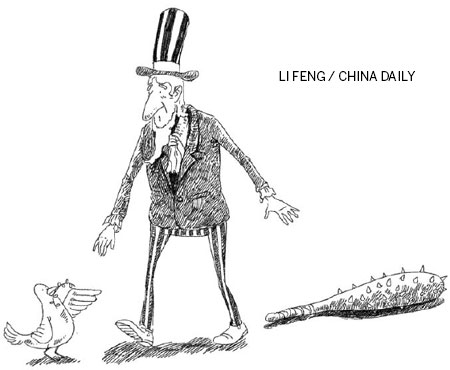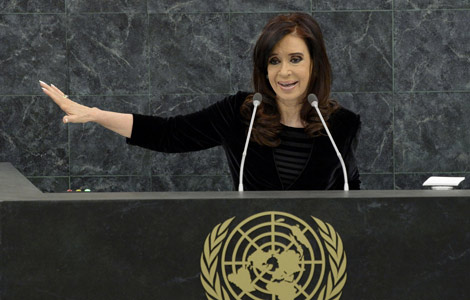Slouching towards multilateralism
Updated: 2013-09-25 07:58
By Philip J. Cunningham (China Daily)
|
||||||||
The tragic crisis in Syria is giving the world a glimpse of what a multilateral future might look like. Instead of going it alone, the United States has decided to compromise and work with other stakeholders in the international system.
The difference between dropping and not dropping bombs on Syria is not just the difference between the merits of war and diplomacy. Rather it's the first glimpse of a new world order, in which the US has an important role to play, but doesn't always get things its way, especially when the leadership lacks support at home and abroad.
It was far from US President Barack Obama's finest moment, but he was far-sighted enough to put a bad decision on hold, with the knowledge that flip-flops and lousy optics don't matter if he gets the right fix for the problem in the long run. He proved he's still got game; caught flat-footed in a corner, he threw the ball to Russian President Vladimir Putin.
As for this turnabout, the American public gets some of the credit, for citizens in all walks of life made it clear, through the media, on the Internet and through their elected representatives, that they are war-weary. Fans started to boo Team America when it adopted the gangster pose of a gung-ho gunslinger.
A bellicose US president has backed down for lack of support, though he remains truculent enough to reserve the right to launch unilateral attacks in the future, un-vetted and unapproved by Congress, in the name of "national security".
Even after Russia offered what appears to be an effective way out, Obama symbolically stuck to his guns, delivering a prime-time war speech riddled with internal contradictions and doubts. On the one hand, the boilerplate script for a call to arms was full of rash, rhetorical bravado, asking Americans to watch the sickening news videos from Syria, as if to provoke a visceral reaction that would cloud clear thinking.
Furthermore the offensive was billed as a "no boots on the ground" affair, which is code for killing without fear of being killed; an unkind message hammered home by neo-liberal hawks close to the president, such as National Security Advisor Susan Rice and UN Ambassador Samantha Powers.
On the other hand, enough wiggle room was left to make way for the weak possibility that there remained a peaceful way to squelch Syria's chemical weaponry, if Russia came out in support of verifiable inspections.
If the community of nations is to evolve beyond the one-sided bullying of unilateralism to the communal decision-making of multilateralism, the US needs to behave more democratically in international forums.
Cutting back on the excesses of US exceptionalism by which it makes the rules but doesn't necessarily abide by them would be a good start. The US leads the world in arms sales, so-called "conventional weapons", the horrific use of which does not constitute crossing a red line. The US also possesses chemical weapons, used napalm to brutal effect in Vietnam and currently uses chemicals to execute death row prisoners. And don't even think about sharing videos of civilians killed by US aerial strikes; former US Army soldier Bradley Manning did just that and he's behind bars now.
The imperial long table at which the US presides like a king needs to be replaced by a round table of major powers, where mutual respect is accorded to all. Despite his strongman posturing, Putin showed a willingness to sit at such a table, and indeed his country is an important stakeholder with a role to play in bringing peace to Syria.
China has managed to stay mostly out of the fray, but has been quietly insistent on a diplomatic solution to Syria's woes.
Nothing drove home US isolation more powerfully than the way Britain, America's closest ally, and over-eager supporter of the morally bankrupt war in Iraq, flatly refused to support the US plan for military intervention in Syria despite Prime Minister David Cameron's insistence on launching an attack.
This downshift in US supremacy is nothing to be downcast about; the US is, and will continue to be, a key player for decades to come. But the reality of a multipolar world does call for greater prudence and caution in projecting power, especially when it comes to violent intervention abroad.
One can see an evolution, from the brutal and foolish unilateralism, which characterized the trumped-up war in Iraq, to the cautious multilateralism that the crisis in Syria requires. This does not necessarily represent a diminution of US influence, but a new kind of influence that is being conducted in concert with other nations.
The over-taxed, under-appreciated citizens of the US need not mourn the passing of America's unilateral moment, rather they should welcome the sharing of heavy burdens when it comes to the thankless burden of policing the world.
Multilateralism has its constraints and frustrations, but it is rightly intolerant of letting any single leader launch punitive expeditions or declare a war at will, and as such provides useful checks and balances. At the same time, putting more effort into working with the UN, and less effort into undermining it - and spying on it - will help the US to mend relations with strong, self-respecting partners like Russia, China and Brazil.
There's no simple formula to stop Syria's civil war, but adding bombs to the mix, and supplying weapons to radical jihadi fighters is unlikely to bring about peace.
Working with other countries for a diplomatic solution to this and other vexing problems may not be easy, and it may not make optimal use of America's awesome arsenal, but paradoxically it will strengthen the US if the careless habit of being a go-it-alone cowboy can be converted into a willingness to do the hard work of working with others for a more just world.
The author is a visiting research fellow at Cornell University, New York.

(China Daily USA 09/25/2013 page12)

 World leaders at UN General Assembly
World leaders at UN General Assembly In photos: Deadly earthquake in Pakistan
In photos: Deadly earthquake in Pakistan
 China to inaugurate Shanghai FTZ on Sept 29
China to inaugurate Shanghai FTZ on Sept 29
 China's investment a 'job-saver' in Europe
China's investment a 'job-saver' in Europe
 Pollution control plan to slash PM2.5
Pollution control plan to slash PM2.5
 The beauty and beasts of selling hot houses
The beauty and beasts of selling hot houses
 Tian'anmen's flowery moments for National Day
Tian'anmen's flowery moments for National Day
 When animals meet beer
When animals meet beer
Most Viewed
Editor's Picks

|

|

|

|

|

|
Today's Top News
208 killed as quake hits SW Pakistan
Foreign Minister Wang makes the rounds at UN
China to surpass US as top trader
Smithfield voters approve deal
Ultra wealthy population shrinks in China: report
White House to enroll millions in Obamacare
Brazilian president blasts US for spying
Kenya mall siege 'over' but death toll unclear
US Weekly

|

|




